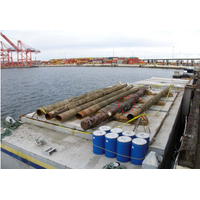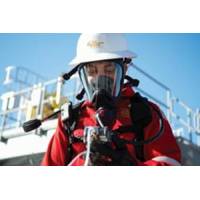
NTSB Recommends Pipeline Operators Implement Safety Management Systems
The U.S. National Transportation Safety Board (NTSB) is recommending new notification alarms and procedures for potential incursions on pipelines and a change to an anchorage off the California coast following a crude oil release in 2021 caused by ship anchors damaging an underwater pipeline.NTSB investigators determined that the oil leak, which began on October 1, 2021, in San Pedro Bay, resulted from an anchor strike on the pipeline that occurred eight months earlier, when anchors from the containerships Beijing and MSC Danit dragged and contacted the pipeline during high winds and seas caused by a
DCSA Releases Cyber-Security Guide
.The best practices outlined by DCSA provide all shipping companies with a common language and a manageable, task-based approach for meeting the IMO’s January 2021 implementation timeframe, DCSA said in a statement.IMO’s Resolution MSC.428(98) on Maritime Cyber Risk Management in Safety Management Systems was adopted in 2017 to ensure that vessels’ cyber risks are appropriately addressed in existing safety management systems.The guidelines provide high-level recommendations related to maritime cyber risk management in order to protect vessel’s against current and emerging cyber

World’s First Decommissioning Collaboration Tool
scope. With the scale of decommissioning set to significantly ramp up over coming decades, however, efforts to collaborate efficiently will need to match this pace. iVISION effectively enables the collaborative approach required by industry, providing a platform for operators to integrate safety management systems and technical knowledge, and realise cost-savings through lessons learned, knowledge retention and video capture. Martin Slowey has recently been appointed to head up Exceed’s iVISION business unit. Bringing with him more than 20 years’ in the oil and gas sector and experience
BSEE Issues Alert on DP System Failure
should ensure hazards associated with a loss of position by contracted DP vessels are analyzed and managed with appropriate contractor safe work practices. Reference 1: BSEE/USCG Memorandum of Agreement OCS-07 “Safety and Environmental Management Systems (SEMS) and Safety Management Systems (SMS)” (April 30, 2013). Reference 2: ISM Code Regulations 7 and 10 (2014 ed.). Reference 3: DP Operations Guidance, Part 2 Appendix 2: DP Project /Construction Vessels (Dynamic Positioning Committee of the Marine Technology Society to aid in the safe and effective management of
Foster Wheeler Honored With UK's RoSPA Award 7th Time
58 years, recognize commitment to continuous improvement in accident and ill health prevention at work. Through the scheme, which is open to businesses and organizations of all types and sizes from across the UK and overseas, judges consider entrants’ overarching occupational health and safety management systems, including practices such as leadership and workforce involvement. David Rawlins, Awards Manager, RoSPA, said, “The RoSPA Awards encourage the raising of occupational health and safety standards across the board. Organizations that gain recognition for their health and safety management
Joint Safety Alert: DPS Failure on Vessels
this type of OCS activity and wish to highlight the interaction between a vessel’s Safety Management System (SMS) and a leaseholder’s Safety and Environmental Management System (SEMS). See our Memorandum of Agreement OCS-07 “Safety and Environmental Management Systems and Safety Management Systems”. The incident report highlighted the following: Vessel SMS - The vessel has a valid International Safety Management (ISM) certificate issued by its Flag State. The Coast Guard reminds vessel owners and operators that compliance with the ISM Code, when
Shell's Arctic Operations: US Government Launches Probe
. ” The review of Shell’s Arctic activities will be led by Interior’s Bureau of Ocean Energy Management (BOEM) Director Tommy Beaudreau, who has been selected to serve as the Acting Assistant Secretary for Land and Minerals Management. The review will look at Shell’s safety management systems, its oversight of contracted services, and its ability to meet the strict standards in place for Arctic development.

SMS Launch Hydrogen Sulfide Safety Program
Safety Management Systems (SMS) is now offering an H₂S health and safety program for the oil & gas industry. Hydrogen sulfide gas, or H₂S, is the second most deadly gas and develops along with crude oil and natural gas. Because of this, having the proper H₂S safety measures in place is imperative to any company working with oil & gas. The new SMS H₂S program offers the oil & gas industry the most comprehensive H₂S solution on the market. SMS boasts highly-trained H₂S technicians along with the best equipment and most advanced technology available in a rental program. SMS attracts
 December 2025
December 2025





